Pride month is so cringe. I’ve always thought so, but not particularly because it is about gays.
It’s because it is about sex.
Valentine’s Day is the closest thing heterosexuals have to Pride month, although it is hardly the same thing. It has nothing to do with where one’s genitals go or what one does to get sexual pleasure. There is an implied tie to sex, of course, but not especially sexual preferences.
Of course, I am a bit of a prude–I have no problem with public displays of affection–light kissing, hugging, or holding hands–but regardless of sexual orientation, I have never liked seeing people cross the line from affection to more explicitly sexual displays which ought to be private.
In short, I think of sex and sexuality as private, to be shared if at all in locker rooms and among close friends (as jokes), and with one’s partners in private.
I even quit reading most tech blogs because they kept on reviewing sex toys, describing the varying levels of sexual pleasure derived from toys designed to enhance one’s onanistic experience.
Yuck.
So “Pride” just seems off to me as a concept. Shouting your sexual preferences is inappropriate in my view. Do you really want to know my favorite sexual acts? Do you even want to think about them?
I doubt it. I certainly don’t want my retailers and brands to pry into such matters. “It’s National Blowjob Day!” is not something I need Walmart to shout out.
Yet here we are, in yet another month where we are force-fed rainbows, unicorns, and now gender-affirmation surgery.
Target and Bud Light have taken it on the chin for their recent forays into Pride-themed marketing, but WalMart has decided to go all out this Pride month.
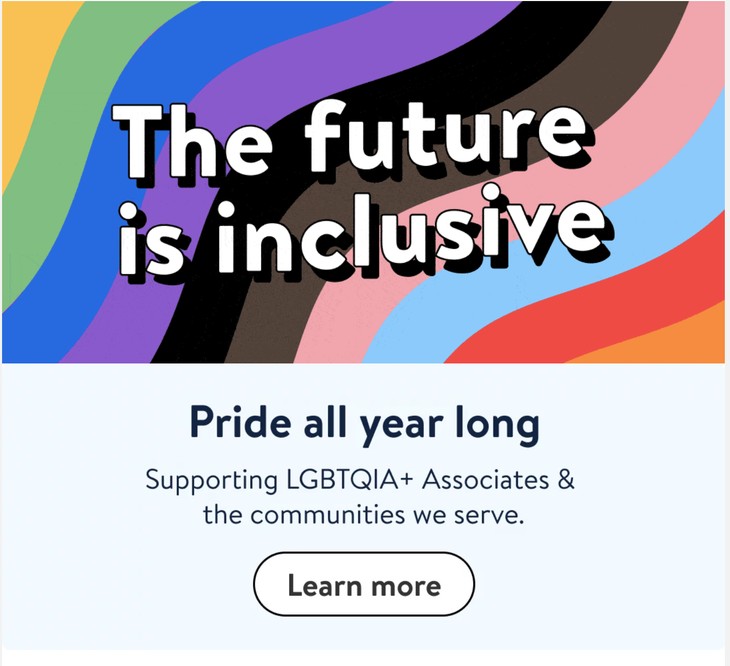
I’m not in a position to predict whether this will hurt or help them, and I’m also not sure whether they are sticking to their principles or buckling to the ESG blackmail that emanates from BlackRock, Vanguard, and CalPERS. I can’t see into their minds, although given their customer base it seems an odd choice. But then again, Bud Light showed that marketing professionals often don’t care for their customers.
Target, at least, markets to suburban moms who are most likely to sympathize with left-wing causes; Walmart, not so much. On the other hand, people go to Walmart based almost exclusively on price, and unlike Bud Light, the alternatives are fewer. Target has always had a social justice component to its marketing; Walmart provides always low prices; always.
The marketing email I got from Walmart was certainly in your face. They are not soft-selling their support for the Pride agenda, although I see no outward indication that they are pushing a transgender agenda in their marketing. This is likely a concession to the controversies.
However, when you dig into their website they certainly seem to cater to some of the more…exotic…tastes in clothes and accessories.
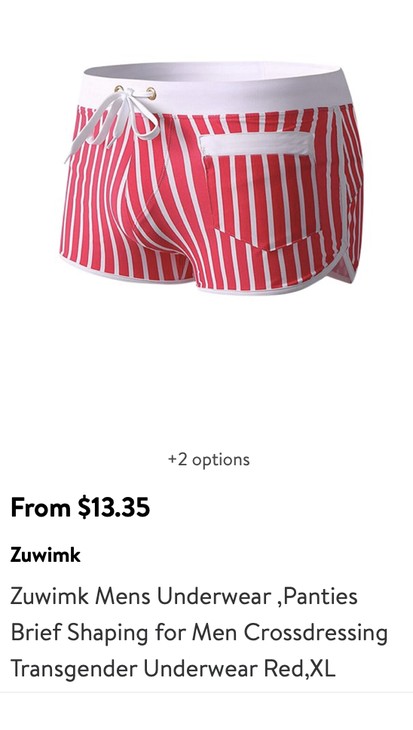
Why Walmart has chosen to get into the “tucking” underwear business is a mystery to me. It seems to be a niche product on which they will make little money and for which they will get a lot of grief. Yet again, if not marketed to children it really isn’t my business.
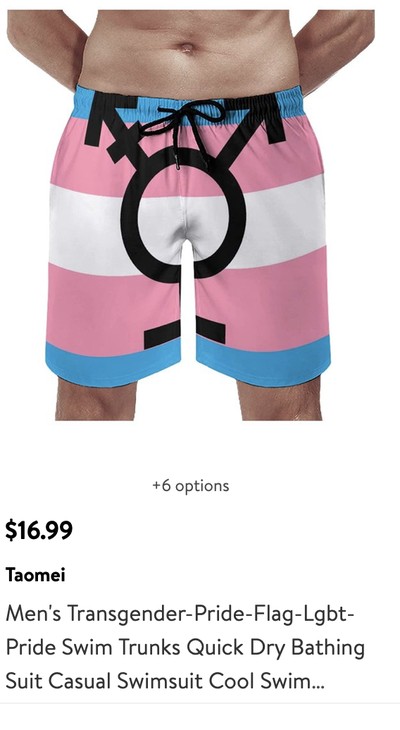
And why does somebody who is transgender or who wants to be an ally wants swim trunks with a circle around their genitals? And why does Walmart want its brand to be associated with a message that says “Look at my crotch?” It is mystifying.
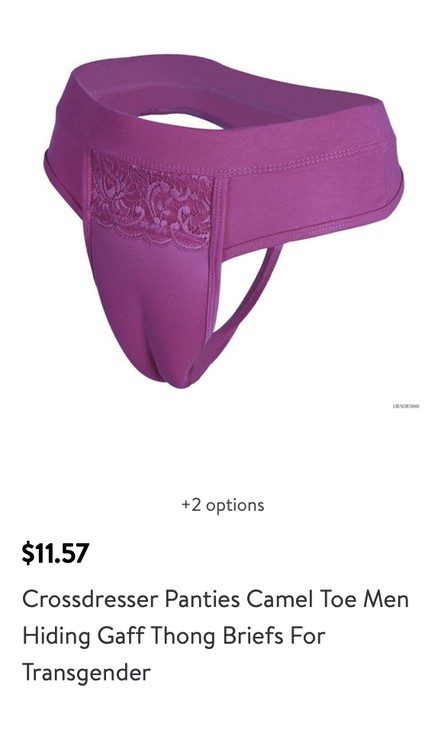
It seems to me that it makes sense for a major corporation with as wide a customer base as Walmart to have products geared to LGB customers, and if they want Pride merchandise then there is nothing wrong with the company providing such products. I choose not to buy it, but the vast majority of products Walmart carries are not on my shopping list.
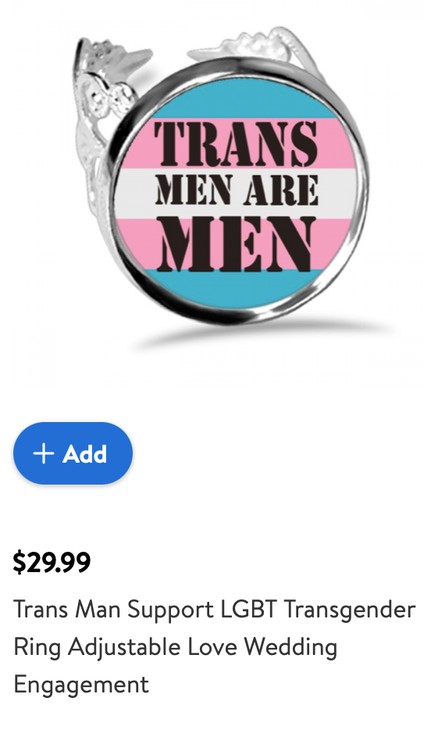
I certainly wouldn’t boycott the store for carrying things I don’t care for. Target earned its boycott by directly marketing its wares to children, not because it carried or even promoted Pride products. As usual, going after children is the line that shall not be crossed.
But Walmart might still face the Bud Light problem, which was different than Target’s: insulting its customers.
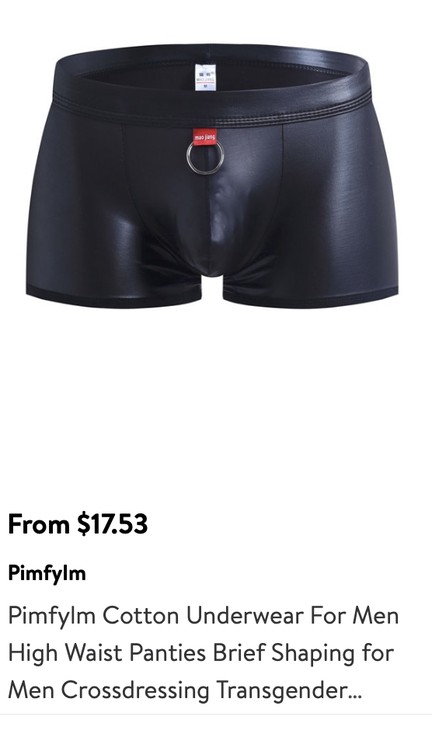
Marketing is not really about selling products, but associating brands with positive images for the customers. That is why Bud Light’s earlier marketing was so effective. As much as Bud Light made about its fine taste, nobody bought the beer because they preferred it to others from which it is nearly indistinguishable.
They bought it because of gorgeous chicks and Spuds MacKenzie. They chuckled at the latter and wanted to be associated with, literally, the former. Bud Light was bought rather mindlessly because it had positive associations, just as Coke uses polar bears because they are cute.
Commercials like this are about generating “goodwill,” which is the value the brand carries by being the brand. As much as we like to think people make purchasing decisions solely by picking the products they prefer, the psychology of purchasing is more complicated. We gravitate to brands, even more than products. There are “Apple” people who will buy a product sight unseen because it is Apple.
Will Walmart suffer by losing goodwill? It’s hard to say. I suspect their customers are stickier than Target’s because they are more price-conscious, and the Walmart brand is cheaper, not tonier. People may grumble, but will they change buying practices?
I am more skeptical.
On the other hand, Walmart’s customers are likely to be more blue-collar than white, so they may be more sensitive to perceived insults.
I am not brave enough to wade into the prediction business on this question. I suspect that the powers that be at Walmart were very careful about avoiding any explicit marketing to children–although some of their charitable partners are definitely aiming their message at kids. GLAAD and “Ditch the Label” have sexual messages for kids, but they are one step removed from Walmart itself.
Perhaps the most interesting thing about this email is the timing: it arrived in my email box on June 4th, not June 1. That suggests to me that they spent some time readjusting their marketing and perhaps even testing it with focus groups to avoid the worst controversies.
I would be surprised if they didn’t. This has suddenly become a minefield.
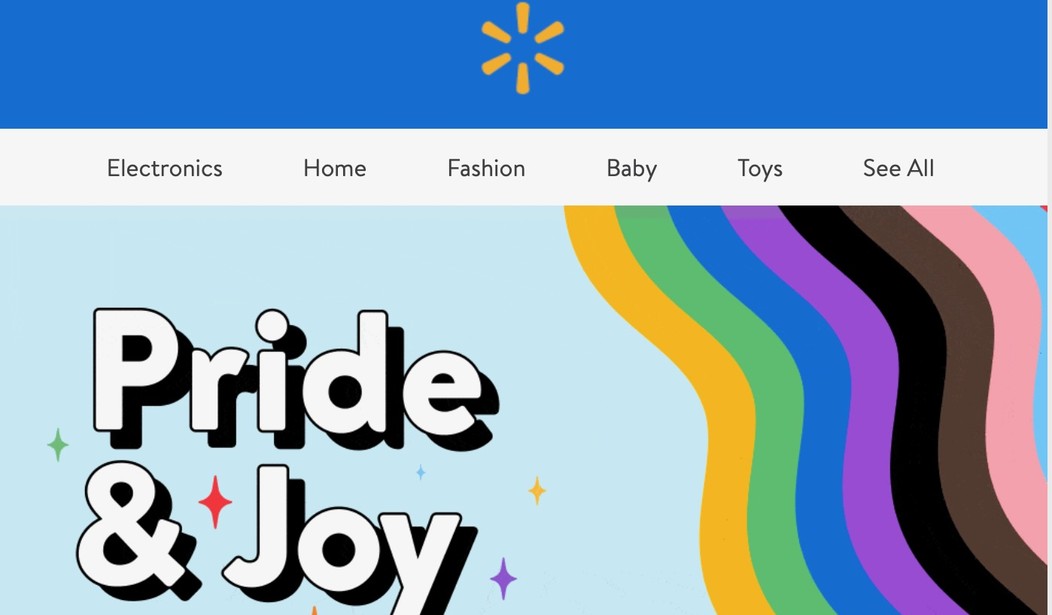








Join the conversation as a VIP Member